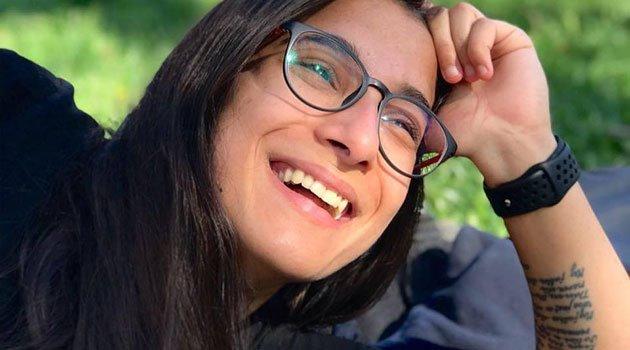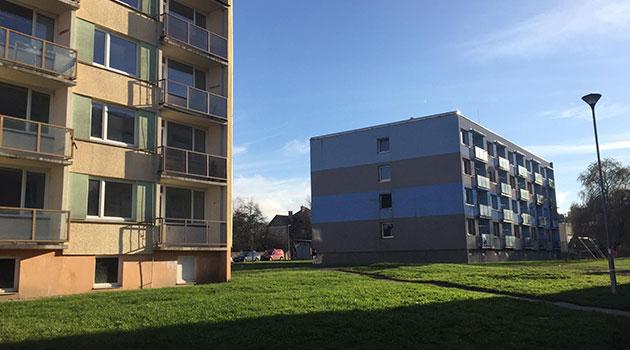Lucie Lucassen, Romani community member in the Czech Republic, plans to adopt a Romani orphan - like she once was herself

She was raised by foster parents and did not want to acknowledge her Romani heritage for a long time,but when Lucie Lucassen began working for one of the biggest Romani nonprofit organizations in the Czech Republic and got to know other Romani community members up close, she came to grips with her own identity and began to take an interest in the history of the Romani people. “I have not been working long for the Brno office of IQ Roma Service, but working in the social field is fulfilling to me,” the 21-year-old begins our conversation, revealing that it was a bit accidental how she began working exactly for a nonprofit organization aiding the socially vulnerable.
“What I like the most is the diversity of the projects we offer to those in need – a preschool club, a drop-in club, scholarships, and tutoring for Romani pupils and students,” Lucassen says, mentioning that she has always felt close to the helping professions because she is a nursing school graduate. “The head of a project called Symbios, where I’m something like a participant in shared housing for college students and young adults aging out of children’s homes or other forms of insititutional care, told me about the opportunity to work at IQ Roma Service.”
Social work is that much more meaningful to her because she can aid those who feel the ground falling away under their feet with regaining their stability. Thanks to her work, she has also met the Romani community and realized that she wants to focus on them long-term because they need the most assistance out of all the groups, whether as children or as senior citizens.
From the hospital to social work
“After graduating, I worked for a bit at the Hospital near St. Anna as a nurse in the surgery department, but I didn’t really take to healthcare. It seemed to me that people who work in hospitals don’t have much time for their personal lives and have no time for anything besides work,” Lucie explains before revealing what she is dedicated to now at the IQ Roma Service organization.
“In Brno, the Romani community has a very good standard of living, but on the other hand there are also people here suffering from social exclusion, poverty and xenophobia. Of all those problems, we work on finding housing exactly for those in social need, because as Romani people, they have long experienced discrimination and unnecessary rejection. I, too, have personal experience of landlords and real estate agents not wanting to rent an apartment to me because I was a 19-year-old Romani woman. Back then I was clueless and didn’t know how to defend myself,” the native of Přerov says.
“First and foremost we address our clients’ debts and the multiple collections proceedings they’re involved in, which is one of the most burning problems they grapple with, besides housing. We also address matters associated with finding employment, or more recently with distance learning, where children from dispossessed families don’t have the necessary technology to join online instruction. Even though the schools knew that was the case, in some cases the teachers addressed the children’s absences by calling them unexcused, which means they are at risk of being given demerits by the principal and poor grades in behavior. We’ll see how that turns out, though, for the time being a solution is still being sought and we don’t yet know what the final outcome will be,” Lucassen describes her work.
Currently she is in charge of nine clients total, all of whom trust her despite the fact that she is quite young. “In addition to the social work, I also work in Vyškov and in Ivanovice na Hané as a field worker with the Social Activation Services (SAS) and sometimes clients usually turn to me right on the street,” she says.
Lucassen does her best not to bring her work hoome with her. “You should clear your mind, but sometimes you can’t help yourself and you’re thinking about the client when you’re home. Everybody who works in the helping professions goes through that, though. In any event, I plan to continue in the social area, I will complete a course focused on social work that will make it possible for me to do my job even better,” she says.
They had 18 years
“When my biological mother gave birth to me, she gave me up and put me into an institution for newborns that very same day. After that I was sent straight to a children’s home, where I remained until the age of six,” Lucassen says of her childhood.
“After that I was placed with my current foster mother, whom I consider my Mom today,” the young woman relates. She is not in contact with her biological family and has never met any of them.
“When I was younger, it would sometimes occur to me that I wanted to know the reason why they gave me up. However, I eventually decided there is no point, because they themselves knew best where they were placing me and where I would grow up,” she says.
“They had 18 years to contact me and they never did. I do remember that my biological mother came to the children’s home to visit me once,” Lucassen recalls.
“She arrived, stole something, and left. I understood it wasn’t worth worrying about and that I needed to look to the future,” says Lucassen, who took her foster parents’ surname this year.
Not only had the time come for Lucassen to be associated with her foster parents by name, she says it is also more practical for her and her foster mother, who took the surname Lucassen when she got married, not to have different surnames. She herself is thinking about adopting a child from a children’s home someday.
“I’ve been thinking about adoption for a long time. Basically I’ve also been thinking about fostering, although I have reservations about some foster parents, because it seems to me that some abuse their positions,” Lucassen says.
“However, on the other hand, there are many foster parents without whom nothing would work because they do a commendable job, and we should say thanks for that. If I do adopt a child, it will be a Romani one,” she says of her plans.
Lucassen says that it has never been a problem for her to reveal that the people she considers her parents are not biologically related to her. “I’m very proud of both of them because they managed to raise me as an honest person, and they never made me feel as if I wasn’t theirs,” she says with a smile.
She recalls one Christmas in the children’s home spent with just two other children because all the others had already been taken by foster parents. At the time she had the feeling nobody wanted her because she was a Romani girl.
Identity
“I didn’t want to admit that I am Romani for a long time – I didn’t grow up in a Romani family, and I don’t speak Romanes. It might have also been because of the bullying I experienced in primary school, which sort of broke off once I went to high school. Those around me would say I looked more like a Spanish girl,” she reflects.
“Recently, though, when somebody asked me where I’m from, I answered that I’m Romani. I don’t have a problem saying it. Certainly my close contact with other Romani people has aided me with this, all the people I’m meeting thanks to my work – not just as clients, but especially as colleagues, because there are rouhgly 80 people at work and it’s a mixed group, proportionally,” she says, then reveals how her foster family responded to her accepting her Romani identity.
“They just said: ‘Finally!” she laughs. “Mom had done her very best, in every possible way, to get me to accept my Romani identity – for example, we visited the Museum of Romani Culture in Brno – but back then I was angry with her about it. It takes time. When I look back now, my assessment is that I was afraid of being condemned by others. That fear was unnecessary. Some close friends told me they’d always known and had no problem with it. Others, when they found out, hid their personal stuff and their purses from me. That’s their problem, though, not mine,” Lucassen says.
First published in Czech in Romano voďi magazine
